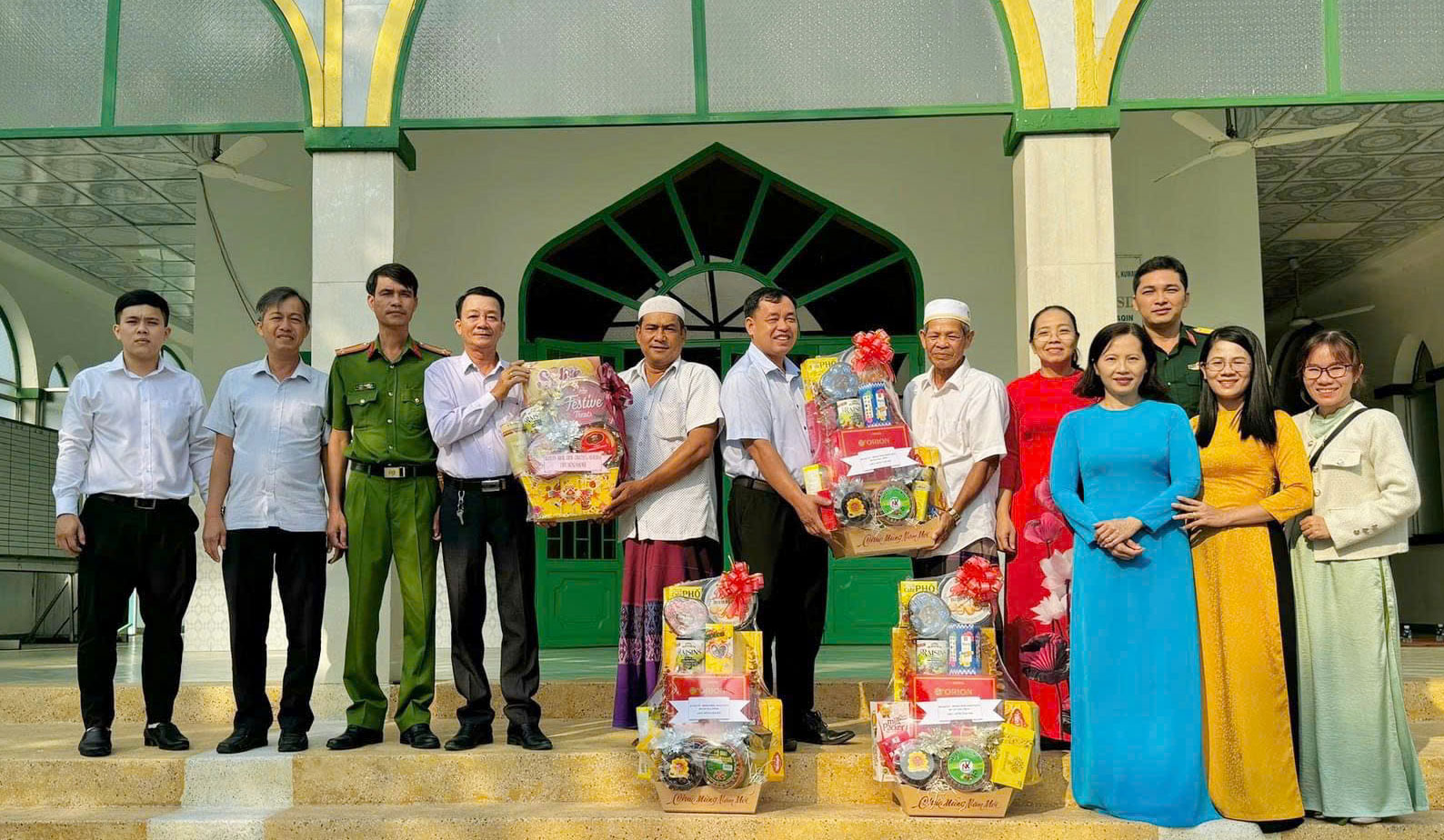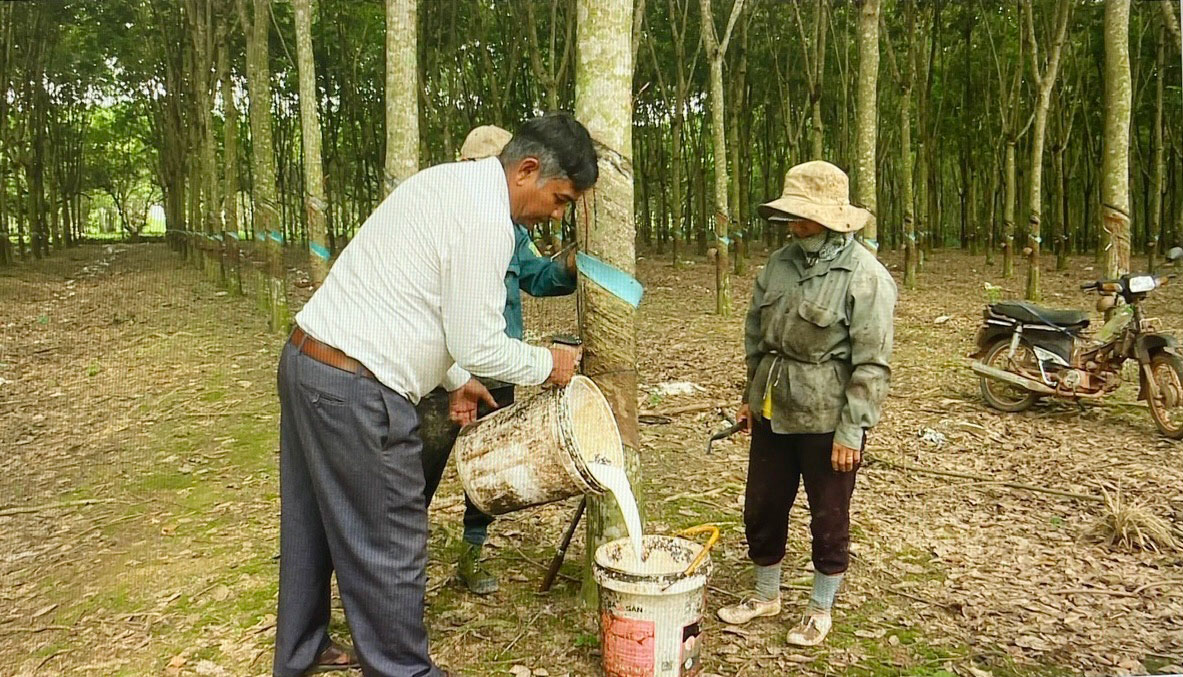Supporting policies of land for ethnicity to promote emergence from normal lives
To continue supporting ethnic minority people in the province, the Provincial People's Council has just issued Resolution No. 15/2024/NQ-HDND on land policies for ethnic minority people (referred to as Resolution No. 15/2024/NQ-HDND). The beneficiaries are individuals of ethnic minority groups living in the province who are classified as poor households or near-poor households according to the province's poverty standards and belong to areas of ethnic minority people, mountainous regions as stipulated by the Government or the Prime Minister's decision.
Assistance plenty
According to the provincial People's Committee, there are currently 28 ethnic groups belonging to ethnic minorities with 7,678 households and 24,094 people in the province. Currently, all households of ethnic minorities in the province generally have stable lives.

Leaders of Dau Tieng district pay gift visit to the ethnic minority at Minh Hoa commune
Mrs. Le Thanh Van, Head of the Land Management Division of the Department of Natural Resources and Environment, stated that Resolution No. 15/2024/NQ-HDND was issued in accordance with the provisions of Article 6, Article 16 of the Land Law 2024, specifically: "The provincial People's Committee submits to the People's Council at the same level for promulgation of local policies on land for ethnic minorities living in the area in accordance with the actual conditions of the locality and implementation organization." This resolution also stipulates land policies for ethnic minorities living in the province classified as poor households, near-poor households under Clause 2 and Clause 3 of Article 16 of the Land Law 2024.
According to that, for the housing support policy: Hand over residential land, allow the change of land use purpose to residential land for the first time within the prescribed limit and receive a 50% reduction in land use fees. The area of residential land handed over, allowing the change of land use purpose, is calculated for the total area of land allocated by the State, allowing the change of land use purpose during the implementation of land policies for ethnic minority people. In cases where the State has allocated land, allowed for a change in land use purpose but there is no longer land available, the land may be allocated for residential purposes or the land use purpose may be changed from a different type of land to residential land, and the land user is exempt from land use fees for the area within the allocated residential land limit as prescribed; in cases where there is a shortage of residential land compared to the allocated residential land limit, the land use purpose may be changed from a different type of land to residential land. For the policy of supporting agricultural land, ethnic minority households are allocated agricultural land within the limit without charging land use fees. In cases where the state has allocated land but now there is no longer agricultural land or the area of agricultural land being used is less than 50% compared to the allocated agricultural land limit, agricultural land will continue to be allocated within the limit and no land use fees will be charged.

Khmer people in An Binh commune, Phu Giao district exploit rubber latex in their self-planted plantation
Resolution No. 15/2024/NQ-HDND also issued regulations on policies to support leasing non-agricultural land that is not residential land for production and business. In that case, in localities where there is no agricultural land fund or the agricultural land area being used is less than 50% of the allocated agricultural land without being able to arrange a land fund, if individuals from ethnic minority groups have a need to rent non-agricultural land that is not for residential purposes for production or business, they will be introduced to locations, considered for land rental, and receive a 50% reduction in land rental fees.
To soon put the policies into life
Mr. Truong Cong Phu, Vice Chairman of the People's Committee of An Binh commune, Phu Giao district, said that currently there are 266 households/1,088 ethnic minority people in the commune, of which more than 120 households have been allocated land. Among the ethnic minority households, there are 2 poor households and 3 near-poor households according to the province's criteria. Resolution No. 15/2024/NQ-HDND aims to achieve sustainable development for ethnic minority communities, including policies on residential land, agricultural land, and non-agricultural land for production and business. This policy not only helps stabilize life, increase income for people in difficult circumstances, helps ethnic minorities have stable farming land, but also encourages economic development, protects culture and living environment of ethnic minorities. “The commune will disseminate the content of these new policies through the commune's radio station, the commune's electronic information page, publicly at the commune People's Committee headquarters, the headquarters of the hamlets' offices; deploy to individuals with credibility in the ethnic minority community to further disseminate to the people,” Mr. Truong Cong Phu added.
Mr. Nguu Bu, a person with prestige among the Khmer people in An Binh commune, Phu Giao district, stated that the Khmer people deeply appreciate the Party and the State for always having caring and supportive policies. In the past, many people without land have been allocated land by the State under Program 135 to work and live in peace of mind.
Recognition shows that, currently, localities with ethnic minority communities are reviewing the beneficiaries under Resolution No. 15/2024/NQ-HDND, while allocating financial resources, land funds to effectively implement land support policies for ethnic minority communities as stipulated in the Resolution.
Reported by Tien Hanh – Thanh Tuyen – Translated by Vi Bao
 Binh Duong Social Policy Bank implements digital transformation to better serve customers
Binh Duong Social Policy Bank implements digital transformation to better serve customers
 Foster love for science and technology in the younger generation
Foster love for science and technology in the younger generation
 Hands joint for environment safety to children
Hands joint for environment safety to children
 NA adopts laws on data, electricity
NA adopts laws on data, electricity
 Binh Duong and Guangxi strengthen educational exchange
Binh Duong and Guangxi strengthen educational exchange
 Demonstrating gratitude, educating on tradition
Demonstrating gratitude, educating on tradition
 Joy in new houses
Joy in new houses
 Regulations on construction of cultural and civilized education space wide-spread
Regulations on construction of cultural and civilized education space wide-spread
 “Robotics and Artificial Intelligence Innovation” competition ignites creativity in youth
“Robotics and Artificial Intelligence Innovation” competition ignites creativity in youth
 MoU signed to foster Vietnam-Canada cooperation in science, technology
MoU signed to foster Vietnam-Canada cooperation in science, technology







